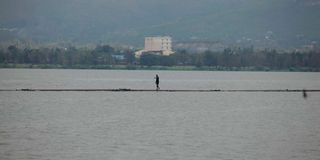Why Lake Victoria’s Winam Gulf is stinking again

Workers conduct dredging of Winam Gulf in Lake Victoria in Kisumu County on August 31, 2021. The project involves removing silt from the lake to enhance the depth around the Kisumu pier. Once completed, the refurbished Kisumu Port will be able to berth huge vessels, which will, in turn, help Kisumu grow into one of East Africa's economic hubs.
What you need to know:
- Sunken portions of water hyacinth are to blame for the stench in Lake Victoria
- Locals says the water cause skin irritation
- KMFRI attributes the smell to ammonia gas production
A foul smell is emanating again from Lake Victoria from the Winam Gulf along the Kisumu-Busia highway, and sunken portions of the water hyacinth are to blame.
The smell, which is forcing those who pass by to hold their breaths, is also attributed to sunken reeds and algae.
And according to Mr Brian Opiyo, the chairperson of the Kichinjio Beach Management Unit, the water causes irritation on the skin when people come into contact with it.
“It is not safe to use this water,” he told Healthy Nation.
Kenya Marine and Fisheries Research Institute (KMFRI) experts in Kisumu say the decomposition effect of the debris is the cause of foul smell.
KMFRI’s Assistant Director, Dr Christopher Aura, said ammonia gas is being produced due to the decomposition process along with increased rains.
“This is due to increased temperatures due to climate change. This has also been causing low oxygen levels and fish deaths in the lake,” said Dr Aura.
Oxygen depletion
He said that decomposing of water plants is a seasonal process triggered by climate change.
“It happens without consistency since it is dependent on increasing temperature and availability of debris such as water hyacinth, algae or reeds,” said Dr Aura.
The decomposition mainly affects fish in terms of oxygen depletion, which may cause fish deaths both in the wild and in cages.
“For farmers engaging in cage fish farming, it may cause fish deaths – and it has done so – during upwelling as anoxic water, deprived of oxygen, replaces the warm surface water. Fish get suffocated and die,” he said.
However, local authorities are out to investigate whether something else is being dumped into the lake.
According to Mr Fred Oluoch, the public health director, the checks are ongoing.
“It is not the first time the lake is producing a bad smell. We are out to check if there’s also illegal dumping of waste into the lake,” said Mr Oluoch.
At the same time, the National Environment Management Authority’s county director, Mr Tom Togo, has warned fishermen against open-drying lake shrimps (ochong’a) along the beach.
“The foul smell originates from the open drying of ochong’a at a landing beach behind Obote Road. We advised the BMU to stop the practice,” said Mr Togo.



